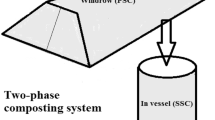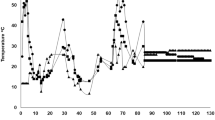Abstract
The aim of this paper was to evaluate the use of different bulking agents in different ratios as a means to control, optimise and eventually reduce the duration of the thermophilic period in two-phase olive oil mill sludge (OOMS) composting. The bulking agents used were: (i) olive tree leaves (OTL), (ii) olive tree shredded branches (OTB) and (iii) woodchips (WDC). The selection of these materials was based on their abundance and availability on the island of Crete, the southernmost point of Greece. The ratios studied were: Pile 1, OOMS:OTL in 1:1 v/v; Pile 2, OOMS:WDC in 1:1.5 v/v; Pile 3, OOMS:OTL in 1:2 v/v; Pile 4, OOMS:OTL:OTB in 1:1:1 v/v; and Pile 5, OOMS:OTL:OTB in 1:1:2 v/v. The composting system used was that of windrows with the volume of each pile approximately 20–25 m3. The experiments took place over two consecutive years. A composting turner was used and turnings were performed at one and two week intervals. In each pile a variety of physiochemical parameters were monitored. Temperature remained high in all five trials. Piles 1, 2, 3, 4 and 5 temperatures recorded values of above 50 °C for 106, 158, 160, 175 and 183 days, respectively. Volumes were reduced by approximately 67%, 62%, 63%, 80% and 84%, respectively. Temperature remained high, mainly due to the presence in large amounts of oily substances which during their complete oxidation release important amounts of energy and aid the cometabolism of more stable molecules such as lignin. This process is better described as the slow “burning” of a “fuel” mixture in an “engine” than composting. This approach is based on the extensive similarities of this process to that of crude oil sludge or similar waste composting.
Similar content being viewed by others
References
JA Alburquerque J Gonzalvez D Garcia J Cegarra (2004) ArticleTitleAgrochemical characterisation of “alperujo”, a solid by-product of the two-phase centrifugation method for olive oil extraction Bioresour. Technol. 91 195–200 Occurrence Handle1:CAS:528:DC%2BD3sXosVWrurs%3D Occurrence Handle10.1016/S0960-8524(03)00177-9
N Beaudin RF Caron R Legros J Ramsay B Ramsay (1999) ArticleTitleIdentification of the key factors affecting composting of a weathered hydrocarbon-contaminated soil Biodegradation 10 IssueID2 127–133 Occurrence Handle10.1023/A:1008365832031
A Demirbas N Ilten (2004) ArticleTitleFuel analyses and thermochemical processing of olive residues Energ. Sources 26 731–738 Occurrence Handle1:CAS:528:DC%2BD2cXlt12itL4%3D Occurrence Handle10.1080/00908310490445571
InstitutionalAuthorNameFCQAO (1996) Methods Book for the Analysis of Compost Federal Compost Quality Assurance Organization – Bundesgutegemeinschoft Kompost e.v Abfall Now e.v. Publishing House, Stuttgart, Germany
A Garcia-Gomez A Roig MP Bernal (2003) ArticleTitleComposting of the solid fraction of olive mill wastewater with olive leaves: organic matter degradation and biological activity Bioresour. Technol. 86 59–64 Occurrence Handle1:CAS:528:DC%2BD38XntVGmurs%3D Occurrence Handle10.1016/S0960-8524(02)00106-2
GF Huang M Fang QT Wu LX Zhou XD Liao JWC Wong (2001) ArticleTitleCo-composting of pig manure with leaves Environ. Technol. 22 1203–1212 Occurrence Handle1:CAS:528:DC%2BD3MXptVKgt7c%3D Occurrence Handle10.1080/09593332208618207
K Hupe J Heerenklage H Woyczechowski S Bollow Stegmann (1998) ArticleTitleInfluence of oxygen on the degradation of diesel fuel in soil bioreactors Acta Biotechnol. 18 109–122 Occurrence Handle1:CAS:528:DyaK1cXkslGlt7Y%3D Occurrence Handle10.1002/abio.370180205
H Kirchmann W Ewnetu (1998) ArticleTitleBiodegradation of petroleum-based oil wastes through composting Biodegradation 9 151–156 Occurrence Handle1:CAS:528:DyaK1MXlt1yq Occurrence Handle10.1023/A:1008355825404
LP Louloudis (1985) Socio-economic and environmental side effects of technological change: the case of olive oil mills in rural Greece DO Hall N Myers N.S. Margaris (Eds) Economics of Ecosystems Management Junk Publication Dordrecht, Netherlands
V Manios C Balis (1983) ArticleTitleRespirometry to determine optimum conditions for the biodegradation of extracted olive press-cake Soil Biol. Biochem. 15 75–83 Occurrence Handle10.1016/0038-0717(83)90122-0
T Manios (2004) ArticleTitleEvaluating the composting potential of different organic solid wastes from the island of Crete and the quality of the end product Environ. Int. 29 1079–1089 Occurrence Handle1:CAS:528:DC%2BD3sXptVSqtLw%3D Occurrence Handle10.1016/S0160-4120(03)00119-3
T Manios K Maniadakis M Kalogeraki E Mari S Terzakis P Magiatis E Mikros LA Skaltsounis V Manios (2004) ArticleTitleCo-composting of olive residuals and green waste on Crete Biocycle 45 67–70 Occurrence Handle1:CAS:528:DC%2BD2cXit1Srsrc%3D
T Manios K Maniadakis N Frantzeskaki EI Stentiford V Manios I Kritsotakis G Dialynas (2003) ArticleTitlePilot scale sewage sludge composting in the Island of Crete, Greece Biocycle 44 53–55
C Paredes MP Bernal J Cegarra A Roig (2002) ArticleTitleBiodegradation of olive oil mill wastewater sludge by its co-composting with agricultural wastes Bioresour. Technol. 85 1–8 Occurrence Handle1:CAS:528:DC%2BD38XksFeqsLY%3D Occurrence Handle10.1016/S0960-8524(02)00078-0
S Saletes FA Siregar JP Caliman T Liwang (2004) ArticleTitleLigno-cellulose composting: case study on monitoring oil palm residuals Compost Sci. Util. 12 372–382
MA Sanchez-Monedero A Roig C Paredes MP Bernal (2001) ArticleTitleNitrogen transformation during organic waste composting by the Rutgers system and its effects on pH, EC and maturity of the composting mixtures Bioresour. Technol. 78 301–308 Occurrence Handle1:CAS:528:DC%2BD3MXjt12qsbk%3D Occurrence Handle10.1016/S0960-8524(01)00031-1
M Tuomela M Vikman A Hatakka M Itavaara (2000) ArticleTitleBiodegradation of lignin in a compost environment: a review Bioresour. Technol. 72 169–183 Occurrence Handle1:CAS:528:DC%2BD3cXkt1Omtw%3D%3D Occurrence Handle10.1016/S0960-8524(99)00104-2
N Vasudevan P Rajaram (2001) ArticleTitleBioremediation of oil sludge-contaminated soil Environ. Int. 26 409–411 Occurrence Handle1:CAS:528:DC%2BD3MXkslOjurg%3D Occurrence Handle10.1016/S0160-4120(01)00020-4
Author information
Authors and Affiliations
Corresponding author
Rights and permissions
About this article
Cite this article
Manios, T., Maniadakis, K., Kalogeraki, M. et al. Efforts to Explain and Control the Prolonged Thermophilic Period in Two-phase Olive Oil Mill Sludge Composting. Biodegradation 17, 285–292 (2006). https://doi.org/10.1007/s10532-005-7566-4
Accepted:
Issue Date:
DOI: https://doi.org/10.1007/s10532-005-7566-4




